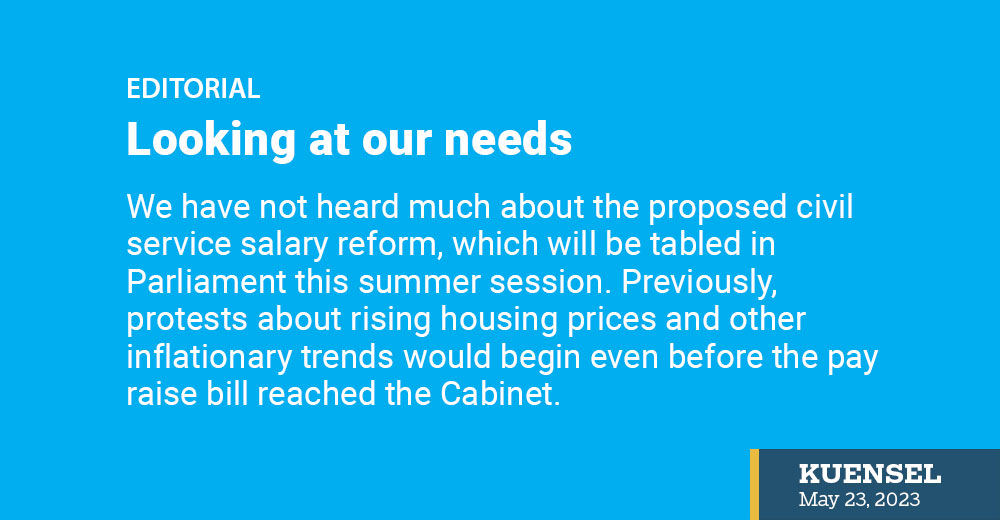We have not heard much about the proposed civil service salary reform, which will be tabled in Parliament this summer session. Previously, protests about rising housing prices and other inflationary trends would begin even before the pay raise bill reached the Cabinet.
With the details of the salary increase being kept under wraps, it may be premature to assume a calm market. The impact is unavoidable because the population that lives on wages drives the consumer market, therefore the response may come in the next weeks and months.
The wage increase is significant. The highest rise in Bhutanese civil service history is 45 percent. While expecting the entire salaried population to be happy is unrealistic, it will alleviate some of the most pressing shortages.
According to the NSB’s most recent statistical study, inflation has been on a downward trend, with the most recent annual inflation of 4.3 percent being driven by growing fuel costs.
Bhutanese consumers should take solace in the fact that, despite inevitable ups and downs, the MRP rule has been usually effective. If the businesses are as obvious as they have been in the past, discerning clients can file a complaint with the authorities. Other commodities, such as local farm products, have mostly been driven by market forces.
The house rent is a thorn in the side of the wage earner, particularly in larger towns. While some salaried professionals claim to pay up to 60 percent of their salary for housing. Although the Tenancy Act aims to limit irregular increases in house rent, the fact remains that house rents will continue to be set by the market.
However, rather than salary raises, the solution resides in practical policies such as price controls on construction supplies and better lending terms that will stimulate affordable housing.
Unlike in some developing countries, where the base income is lower but comes with several obvious and hidden bonuses, the Bhutanese salary structure is consolidated. It is a transparent method in which the salary may be compared to market costs.
We do not pay for health care or education in Bhutan, which are the most expensive expenses in most countries today. Overall, it is safe to assume that Bhutanese people are eating better, dressing better, and living more comfortably than their forebears. More automobiles on the road, more houses on the land, more food in the market, more items in our stores, and more luxury at home.
What we appear to be lacking now is a larger grasp of a developing society in which perceived material demands outpace extraordinary achievements. We have yet to reconcile the conflicts of increased purchasing power and increased discontent.
The concept of Gross National Happiness is intended to counteract such trends. The GNH assumption, derived from Buddhism, is that happiness comes from inside the person; the process of development helps build the environment in which we can attain this as individuals. The salary is a vital part of the broader GNH goal, but no amount of money can buy true pleasure.
Salary increases represent economic development. However, if happiness is to take precedence, Bhutanese society, beginning with the salary-earning leadership, must assess the evolving value system rather than the material change that dominates our lives now.


